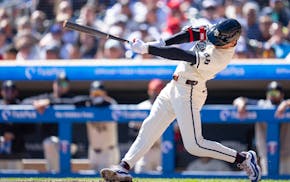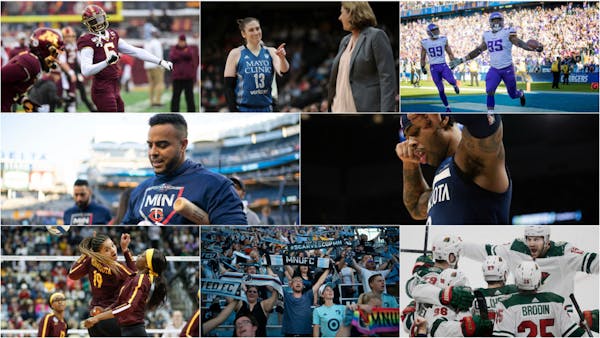Minnesota was scheduled to be the center of the hockey world on New Year's Day after it was awarded the 2021 Winter Classic, but the spotlight could arrive sooner if the NHL chooses to restart the season in the Twin Cities.
"There are rinks all over the place," Wild General Manager Bill Guerin said. "We got a great arena, a great practice rink. There are hotels. It just matches up quick. I'm obviously biased, but I think it'd be a perfect fit."
As part of the return-to-play plan it revealed Tuesday, the NHL officially named Minneapolis/St. Paul one of 10 candidates to host games if the league relaunches later this summer to finish the season that was put on hold in March by the coronavirus pandemic.
Only the top 12 teams from each conference will return, facing off in round-robin play or qualifying rounds to advance to the playoffs, and two hub cities will host each conference.
"We're going to go to the places that we think are the safest and make the most sense medically at the time," Commissioner Gary Bettman said.
Besides the Twin Cities, the NHL is also considering Chicago, Columbus, Dallas, Edmonton, Las Vegas, Los Angeles, Pittsburgh, Toronto and Vancouver.
The league expects to make its picks in three to four weeks, and it isn't focused on an east-west balance.
"We want to just be in a position to, in real time, have lots of options once we understand what the state of play is at the time we need to make the decision," Bettman said.
What could limit Minnesota's competition is Canada's mandatory 14-day quarantine for everyone traveling into the country. If the NHL can't resolve that, league brass said it won't be able to go there.
“There's not many markets out there that have six professional sports franchises. So if anyone knows how to accommodate the needs of pro sports teams that are coming to the market, it's us. So I think that's a huge selling point.”
It also hasn't been figured out if host teams will play in their home arenas or be assigned to the other hub city. Even if a team is stationed in its home market, players will stay in the same accommodations as everyone else rather than going home.
"We certainly see some merit to moving the club to a different market so that any perceived advantages associated with being in a home market are eliminated," Deputy Commissioner Bill Daly said.
At the crux of the NHL's criteria are COVID-19 conditions, testing ability and government regulations.
If given the OK by medical and government officials to start playing, the NHL is expecting to perform regular daily testing — an endeavor that could result in 25,000 to 30,000 tests that cost millions of dollars, an expense the NHL will pay once the season resumes.
"We need to make sure that there's enough testing available, and we'll be needing lots and lots of testing," Bettman said. "But we don't want it to interfere with the medical needs of the community. That has to come first."
Although large gatherings still are prohibited by Gov. Tim Walz, restrictions could loosen by the time the NHL selects its cities or the state could make an exception for the NHL.
Another 33 deaths and 510 confirmed COVID-19 cases in Minnesota were announced Wednesday, bringing the total number of known infections to more than 22,000. But the state has made a push for increased testing, is dotted with health care providers, and has the Mayo Clinic in Rochester, which has conducted research and testing.
Also key for the NHL is infrastructure such as hotels, practice facilities and in-market transportation along with an arena that features four NHL-caliber locker rooms. The league likely will hold multiple games per day and would need room to funnel teams and personnel in and out.
Not only does Xcel Energy Center have six locker rooms on its event level, but TRIA Rink — the Wild's practice facility — is less than a half-mile away. Another dozen-plus rinks with higher-quality amenities are in the area.
The Saint Paul Hotel and InterContinental Saint Paul Riverfront are within walking distance to Xcel Energy, and there are an additional 9,000 hotel rooms in downtown Minneapolis — hotels that are used to the safety, security, privacy and nutrition requirements of pro clubs, said Matt Meunier, director of Sports Minneapolis.
"There's not many markets out there that have six professional sports franchises," Meunier said. "So if anyone knows how to accommodate the needs of pro sports teams that are coming to the market, it's us. So I think that's a huge selling point."
Of all the locations under the microscope, the Twin Cities might be one of the freshest in the league's mind. After all, it wasn't long ago that Minnesota was vetted to host the Winter Classic on New Year's Day in 2021 at Target Field, a decision Meunier described as a vote of confidence that the area can pull off a marquee event.
The circumstances aren't the same for the hub cities, but these destinations would be vital to the NHL if this is how it wraps up the season.
"I don't think we necessarily have to share with the league our credentials in terms of hosting large-scale events," Meunier said. "I think that's already been established, and we've done a great job as a community in the last few years with those. But certainly it's going to be competitive, and there's a lot of good hockey markets. But we are the State of Hockey."

Live: Minnesota United at Charlotte FC. Follow on Gameview.
Jameson Taillon comes off the injured list and helps the Cubs beat the Marlins 8-3
T-wolves take NBA's best defense into series vs. Suns, but can it stop Durant-Booker-Beal trio?

